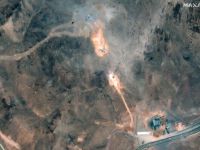Initial steps towards the rehabilitation of Iraq’s communication network are underway by a Chinese company, implementing a $28-million contract for the construction of the country’s first mobile system. The Al-Ittihad weekly quoted an Iraqi official who confirmed that following the green light given by the United Nations in May, the Chinese firm has started installing 60 base stations for a mobile network in Baghdad.
Iraq’s telecommunication infrastructure was nearly wiped out in air raids carried out by the coalition forces during the 1990 Gulf war. The UN sanctions that followed, banned all military and most civilian sales to Iraq, and kept the network in shatters.
A Pyramid Research report has affirmed the devastating effects of the war on the country’s telecommunications, finding that teledensity – the number of telephones per 100 inhabitants — which stood in 1990 at 5.6 percent, had dropped between 1998 and 2001 from 3.3 percent to three percent, reflecting the deterioration in services, equipment and infrastructure.
Pyramid Research analyst Joseph Braude asserts that “a sort of digital divide, roughly coinciding with the 33rd parallel," now separates the improved infrastructure of the predominantly Kurdish north, from the war-torn networks of the south and center.
The costs of rehabilitating Iraq’s fixed-line network are estimated by Braude at one billion dollars. This much-needed restructuring scheme is to be executed over the next seven to ten years, according to the UN Office of the Iraq Program. Hoping to win lucrative contracts for the supply of equipment and expertise that would revive the Iraqi telecom market, international telcom firms keep a close watch for early signs of UN policy change.
In recent years the UN 661 committee, which oversees the implementation of the UN oil-for-food program, has begun authorizing contractors to rebuild some telecom relay towers and to install microwave equipment to improve intercity connections, for humanitarian reasons.
According to the International Telecommunication Union (ITU), $279-million bids for telecom contracts were submitted to the committee, mainly for work in the southern and central regions of Iraq. Some 83 contracts, totaling $71 million, were approved, while 71 projects were either rejected or put on ice. All 154 contracts, however, satisfy no more than 25 percent of Iraq’s current telecommunication requirements, according to Braude.
The greatest share of the UN-licensed projects went to suppliers from Iraq’s western neighbor, Turkey, whose vendors won eight million dollar cable contracts. The public switched telephone network (PSTN is currently being rebuilt with fiber-optic cable and Internet connectivity through the Turkish backbone.
While two-thirds of the total value of the telecom contracts were submitted by Chinese and French companies, most of China's proposals, including the construction of a digital microwave link and switching systems, were put on hold.
China, a security council member who urges an end to sanctions, had reportedly already sealed $55 million in telecommunication contracts with Iraq. None of which, however, have yet been implemented, pending UN approval.
Initially, the contracts had been approved in principle by the UN but were then blocked by US and Britain at the sanctions committee. The joint opposition claimed these contracts were to provide Iraq with equipment, which could be used for both military and civilian purposes, such as fiber-optic cables and microwave radio systems.
Crisis broke in March 2000, as the Wall Street Journal reported that China faced Pentagon allegations that three of its companies, including Huawei Technologies and ZTE Corporation, were already in the field, upgrading Iraq's air defense system by installing such fiber-optic cables at military sites in violation of UN sanctions. The Chinese government refuted the allegations, saying an official investigation concluded that the three companies were in fact doing civilian work, albeit without UN clearance.
Despite this controversial incident, the US recently reactivated more than $80 millions’ worth of Chinese business deals with Iraq. The move came at a time the US was seeking Beijing's support in the UN Security Council to reform Iraqi sanctions. The Iraqis then sent a warning to Beijing through the official Babel newspaper, hinting that Baghdad might not honor those contracts if China backed the joint US-Britain "smart" sanctions proposal.
Although the resolution ultimately fell through due to a Russian veto threat, China did support a list put forward by US and Britain, consisting of items that Iraq could now on import with the council's approval.
China has exported more than two billion dollars worth of goods to sanctions-hit Iraq since a UN humanitarian program was launched in December 1996, according to Iraqi Commerce Minister Muhammad Mahdi Salah. China now ranks third among countries supplying Iraq under the oil-for-food program, after France and Egypt. — (Mena Repot)
© 2001 Mena Report (www.menareport.com)







